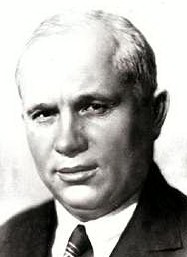
Khrushchev - self love in his mirrors - Revol

Khrushchev - self love in his mirrors - Revol
NIKITA KHRUSHCHEV
(1894-1971). Joseph Stalin, dictator of the Soviet Union for 29 years, died on March 5, 1953. The next day the government radio announced that to "prevent panic" a collective leadership had been formed to rule the Soviet Union. Nikita Khrushchev was not mentioned in the bulletin. Yet within a few years he triumphed over his rivals to become sole dictator of the Soviet Union.
At Stalin's funeral services Khrushchev shared the platform with the Soviet Union's top leaders. He was, however, merely the chairman who introduced the members of the ruling committee. The most important offices went to Georgi M. Malenkov. The other members of the collective leadership were Lavrenti P. Beria, the head of the secret police, and Vyacheslav M. Molotov, who was Stalin's brilliant foreign minister.
Nikita Sergeevich Khrushchev was born on April 17, 1894, in a peasant's hut in the poverty-stricken village of Kalinovka, in southern Russia. Like his father, he became a coal miner. He joined the Communist party in 1918, during the civil war, and became an untiring organizer. Little is known about his first wife, whom he married in 1920. They had two children, Leonid and Yulia. Leonid was killed in World War II. Khrushchev was reported to have married his second wife, Nina Petrovna, in 1938; but she insisted the marriage took place in 1924. They had one son, Sergei, and two daughters, Yelena and Rada.
Khrushchev entered an industrial school in Moscow in 1929. In the mid-1930s he played a major part in carrying out Stalin's purges. In 1938 Stalin sent him back to Ukraine to rid the party of anti-Stalinists. After the government had taken almost all the peasants' land, Khrushchev tried to deprive them of the small private plots they still held.
For the last 14 years of Stalin's rule, Khrushchev was party secretary of the Moscow region and a member of the Politburo (later Presidium), the highest organ of the Communist party. By the time Stalin died, many of Khrushchev's supporters had achieved important posts.
About a week after Stalin's death, Khrushchev wrested control of the party machinery from Malenkov. Then he moved against Beria, head of the secret police. With the help of Marshal Georgi K. Zhukov he had Beria arrested in July 1953. In December Beria and six of his aides were executed. Meanwhile Khrushchev had been named first secretary, the acknowledged head of the Communist party.
In 1955 Khrushchev forced Malenkov to resign as premier, on the ground of "inexperience". The title of premier thenwas given to Marshal Nikolai Bulganin. At that time Marshal Zhukov replaced Bulganin as minister of defense.